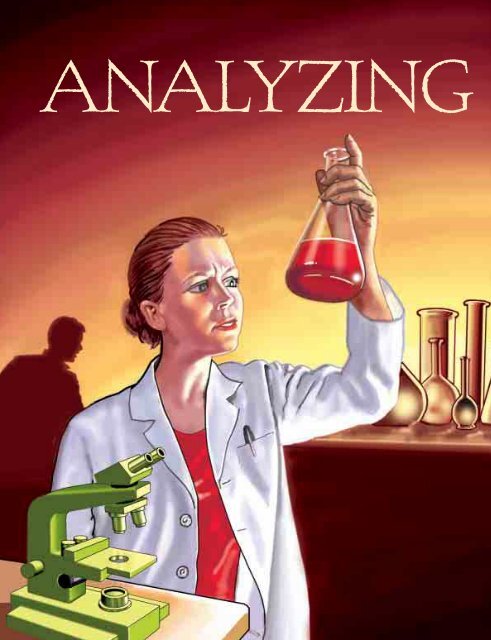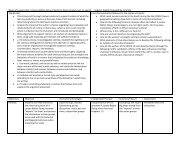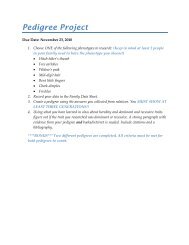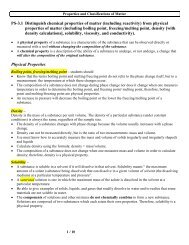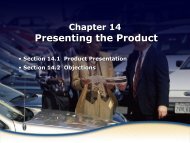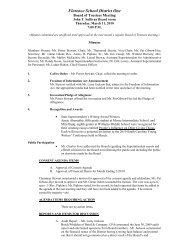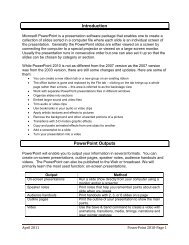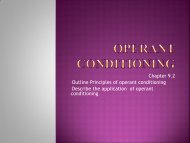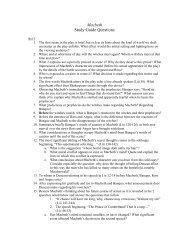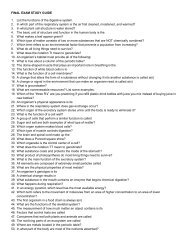DRAMATICS ⢠NOVEMBER 2005
DRAMATICS ⢠NOVEMBER 2005
DRAMATICS ⢠NOVEMBER 2005
You also want an ePaper? Increase the reach of your titles
YUMPU automatically turns print PDFs into web optimized ePapers that Google loves.
ANALYZING<br />
<strong>DRAMATICS</strong> • <strong>NOVEMBER</strong> <strong>2005</strong>
THE SCRIPT<br />
Conflict and objectives<br />
SECOND OF TWO PARTS<br />
BY BRUCE MILLER<br />
AS ACTORS, it is essential that we<br />
understand the story of the play we are<br />
performing because ultimately it is our<br />
job to make choices that will tell that<br />
story well. In fact, telling the story of<br />
the play is an actor’s primary job.<br />
A playwright who knows her craft<br />
will meticulously plan how her story is<br />
to be told. The elements of a good<br />
story work together like gears of a fine<br />
watch. When it’s time to translate<br />
what’s on the page to what is to be<br />
done on the stage, we actors, charged<br />
with fulfilling the playwright’s vision,<br />
must make choices that tell her story<br />
effectively.<br />
Think about the last time you tried<br />
to tell someone the story of the great<br />
movie you just saw. It’s not easy, is it?<br />
Though the story of the film was all<br />
clear to you when you saw it, it’s very<br />
difficult to get all of the details right,<br />
and to deliver them to the listener in<br />
an order that makes it possible for him<br />
to understand the unfolding story. If<br />
you have ever suffered through a story<br />
told by an excited friend who has no<br />
talent for storytelling, you know just<br />
what I mean. Forgotten or misplaced<br />
details fly at you like random machine<br />
gun fire. It’s hard to tell what’s important<br />
and what’s not, and how the<br />
events of the narrative fit together. The<br />
story’s disorganized presentation keeps<br />
it from being clear or compelling.<br />
The good storyteller knows how to<br />
keep the story ticking along clearly<br />
and in a sequence that works for the<br />
listener. The good storyteller also<br />
knows how to build the tension and<br />
keep you asking “what will happen<br />
next?” If you are to do your job effectively<br />
as an actor, you must know the<br />
storytelling gears and understand how<br />
they work together effectively.<br />
In the first installment of this twopart<br />
article on script analysis, we began<br />
our examination of a play to identify<br />
the following elements:<br />
• The given circumstances. The<br />
who, what, when, and where of the<br />
play. The more specifically you define<br />
them, the more specific your choices<br />
will become. Choices that are specific<br />
are more likely to be clear and compelling<br />
than generalized ones.<br />
• Story. The narrative that unfolds<br />
when character, plot, and dialogue are<br />
combined, producing a particular effect,<br />
feeling, idea, or all three.<br />
• Arc or throughline. A map of the<br />
journey a character makes through a<br />
story. It can be literal or figurative in<br />
that it marks the changes a character<br />
undergoes during the course of the<br />
action and provides moments that are<br />
dramatic and revealing.<br />
• Conflict. The engine of drama,<br />
created when the opposing forces that<br />
make a story interesting square off.<br />
• Objective. What the character<br />
needs and pursues at all times, resulting<br />
from the conflict the playwright<br />
creates.<br />
• Moments. Specific islands of import<br />
in the story’s progression or arc;<br />
places in the script where moments<br />
can be made, revealed, and/or portrayed<br />
dramatically. Victories, defeats,<br />
and discoveries are often made there.<br />
• Physical actions. The things the<br />
actor chooses to do physically to make<br />
thought and feelings clear.<br />
Last month we began an analysis of<br />
the ten-minute play Eukiah by Lanford<br />
Wilson. We accumulated a detailed set<br />
of given circumstances, outlined the<br />
story, and scored the chronological<br />
cause-and-effect sequence of actions<br />
from beginning to end. Our examination<br />
was based on the premise that everything<br />
a playwright puts into his<br />
script is there for a reason, and our<br />
ability as actors to effectively use what<br />
is in that script will help us make<br />
choices that are compelling to watch<br />
and that will help tell the story in the<br />
most effective way.<br />
As we continue, we will take a<br />
closer look at the actions contained in<br />
the story. I think we will find that those<br />
actions are painstakingly laid out by<br />
the playwright, not unlike railroad<br />
tracks that will take us to a predetermined<br />
destination. When we follow the<br />
railroad tracks the playwright has laid<br />
down, we are much more likely to<br />
serve both the story and ourselves as<br />
actors than if we tried to make our<br />
own path to the end.<br />
In this article we are going to focus<br />
on the conflict found in the play and<br />
figure out its relationship to the characters’<br />
objectives. We will then analyze<br />
the script for possible objectives to<br />
play, and then apply those chosen objectives<br />
to the script directly. Ultimately,<br />
we want to be able to divide<br />
the play into beats, using objectives<br />
and tactics. This will allow us to score<br />
<strong>NOVEMBER</strong> <strong>2005</strong> • <strong>DRAMATICS</strong>
the story contained in the script and<br />
reveal who the characters are through<br />
the actions we choose to play and<br />
how we play them.<br />
First let’s read the play again on<br />
the following pages.<br />
Conflict<br />
Even though you looked very closely<br />
at the text last time, your understanding<br />
of the machinery of the action is<br />
still missing an important ingredient.<br />
This ingredient is the catalyst that will<br />
insure the story you tell will be a<br />
good one. It is conflict, which is often<br />
referred to as the engine of drama.<br />
The action of any play centers around<br />
its conflict. Invariably the characters in<br />
the story are forced to choose a<br />
course of action that is intended to resolve<br />
the conflict, and the conflict will<br />
continue to fuel the action until it is<br />
finally resolved. In most stories, the<br />
main conflict comes from the opposition<br />
of characters who somehow stand<br />
in each other’s way.<br />
The basic conflicts possible in a<br />
story include person versus person,<br />
person versus himself, (an internal<br />
conflict), or in rarer cases, person versus<br />
nature. Keeping that in mind, see<br />
if you can determine the answers to<br />
the following questions about Eukiah:<br />
• What conflicts are found in the<br />
play?<br />
• Which of these conflicts is most<br />
important? Why and how?<br />
• What are the connections between<br />
the conflicts in the story and its<br />
two characters? How do these conflicts<br />
generate the action of the play?<br />
The action in Eukiah has one central<br />
conflict from which all the action<br />
originates. Butch wants to eliminate<br />
the problem created when Eukiah<br />
overhears a conversation about Butch’s<br />
insurance scheme, and Eukiah wants<br />
to keep his beloved horses safe.<br />
These goals are in stark opposition to<br />
each other because Eukiah will not<br />
permit the horses to be destroyed for<br />
insurance money. In addition to this<br />
central conflict, Eukiah goes through a<br />
series of internal conflicts generated<br />
by Butch’s tactics, which keep shifting<br />
the way Eukiah perceives the situation.<br />
<strong>DRAMATICS</strong> • <strong>NOVEMBER</strong> <strong>2005</strong><br />
As with so much of the analysis process,<br />
there are no absolute correct answers;<br />
there are only answers that<br />
work best to tell the story of the play<br />
and your character. Eukiah, the character,<br />
might be said to have both internal<br />
and person versus person conflicts.<br />
Though he will do anything to save his<br />
horses, his wit is no match for Butch’s.<br />
Butch keeps finding new ways to cast<br />
doubt on Eukiah’s resolve, and each<br />
time Butch pitches something new,<br />
Eukiah must not only fend off Butch,<br />
but must resolve his own conflicting<br />
internal desires as well. Though he<br />
wants to protect his horses, he doesn’t<br />
want to be thought of as half-witted.<br />
He doesn’t want to hold up dinner. He<br />
would like to hear about Butch’s date,<br />
and he certainly doesn’t want to lose<br />
Butch’s friendship. In short, for a kid<br />
with limited mental skills, Eukiah has a<br />
lot to think through. It is these internal<br />
conflicts that ultimately weaken his resolve<br />
and eventually undo him. And<br />
that, significantly, is what allows Butch<br />
to achieve his goal.<br />
Butch, on the other hand, must listen<br />
at all times, analyze what seems to<br />
be working and what does not, and<br />
make adjustments accordingly. But he<br />
never veers from his overall objective:<br />
to seduce Eukiah out of hiding so that<br />
the problem he is causing can be<br />
eliminated permanently. The playwright<br />
has given Butch many tactics to<br />
use on Eukiah. It will be up to the actor<br />
to show the audience when one of<br />
his tactics succeeds or fails, and to<br />
make clear the transition from one tactic<br />
to the next as he observes his moment-by-moment<br />
successes and failures<br />
with Eukiah.<br />
Notice how talking about conflict<br />
automatically leads to a discussion of<br />
objective. Just in case you are unfamiliar<br />
or fuzzy about the term, an objective<br />
(also referred to as intention,<br />
need, want, goal, or action) is the<br />
prize an actor as character must pursue<br />
at all times. Unlike in life, where we<br />
often carry out actions without realizing<br />
why we’re doing them, an actor<br />
must make choices for his character<br />
even when the character may not consciously<br />
be doing so. By playing a spe-<br />
cific objective, and constantly pursuing<br />
tactics to achieve it, the actor as character<br />
is able to find effective choices<br />
and to commit to them. This process of<br />
choosing allows the actor to avoid random<br />
actions that do not contribute to<br />
the story. The strong choices that result<br />
from playing objectives guarantee that<br />
the story will be served. Since any<br />
story is based on conflict, and in a play<br />
that conflict consists of an actor’s objective<br />
pitted against an opposing force, it<br />
follows that by playing an objective at<br />
all times, the actor will be serving the<br />
needs of the script.<br />
Tactics<br />
If you accept the analysis laid out<br />
above, then you are ready to go back<br />
to the script and examine it more<br />
closely. So far we have identified the<br />
overall objectives of the two characters,<br />
but we haven’t yet begun to define the<br />
tactics that are used.<br />
Let is say you are playing Butch, a<br />
richly textured character who tries first<br />
one tactical gambit, then another and<br />
another and another. If you can define<br />
this character’s tactics very specifically,<br />
your work will become the more nuanced<br />
and you will be able to show<br />
many more colors about him. You may<br />
have heard a performance described as<br />
“one-level.” This description usually<br />
refers to an actor who has stuck to a<br />
single choice for smaller objectives or<br />
tactics, resulting in a one-dimensional<br />
character.<br />
Eukiah is the more reactive of the<br />
two characters in the play, and because<br />
of his limited mental powers much of<br />
his stage time will be taken up with<br />
listening. It will be up to the actor<br />
playing this role to define the places in<br />
the script where what Butch says has<br />
particular resonance for him and to react<br />
accordingly. As Butch’s arguments<br />
score points with Eukiah, the boy begins<br />
to change his objectives. It will be<br />
up to the actor to demonstrate why he<br />
begins to talk, why he comes out of<br />
hiding, and why he chooses to move<br />
closer to Butch. When is it that coming<br />
out of hiding to talk to Butch becomes
EUKIAH<br />
A short play by Lanford Wilson<br />
Characters<br />
BUTCH<br />
A horse farm hand<br />
EUKIAH<br />
A boy<br />
The present. A dark empty stage represents a long-abandoned<br />
private airplane hangar. The space is vast and almost entirely<br />
dark. A streak of light from a crack in the roof stripes the<br />
floor.<br />
Butch walks into the light. He is a young, powerful, charming<br />
man; everybody’s best friend. He is also menacing. Nothing<br />
be says is introspective. Everything is for a purpose. During<br />
the indicated beats of silence be listens: for Eukiah to<br />
answer, for the sound of breathing, for the least indication of<br />
where Eukiah is. The play is a seduction.<br />
Voices have a slight echo in here.<br />
BUTCH: Eukiah?<br />
(Beat.)<br />
Eukiah?<br />
(Beat.)<br />
Barry saw you run in here, so I know you’re here. You’re<br />
doin’ it again, Eukiah, you’re jumping to these weird conclusions<br />
you jump to just like some half-wit. You don’t wanna<br />
be called a half-wit, you gotta stop actin’ like a half-wit, don’t<br />
ya? You’re gettin’ to where nobody can joke around you, ya<br />
know that? What kind of fun is a person like that to be<br />
around, huh? One you can’t joke around? We talked about<br />
that before, remember?<br />
(Beat.)<br />
Eukiah? What are you thinkin’? You thinkin’ you heard Barry<br />
say something, you thought he meant it, didn’t you? What did<br />
you think you heard? Huh? What’d you think he meant?<br />
Eukiah?<br />
(Beat.)<br />
Copyright 1991 by Lanford Wilson<br />
CAUTION: Professionals and amateurs are hereby warned that Eukiah is subject<br />
to royalty. It is fully protected under the copyright laws of the United States of<br />
America, the British Commonwealth, including Canada, and all other countries<br />
of the Copyright Union. Inquiries regarding performance rights and royalties<br />
should be directed to Samuel French, Inc., at 45 West 25th Street, New York, NY<br />
10010. Inquiries concerning rights (other than stock or amateur) should be<br />
addressed to the author’s agent, Buddy Thomas, International Creative<br />
Management, Inc., 40 West 57th Street, New York, NY 10019.<br />
You’re gonna have to talk to me, I can’t talk to myself here.<br />
(Beat.)<br />
Have you ever known me to lie to you? Eukiah? Have you<br />
ever known that?<br />
(Pause. He might walk around a bit.)<br />
Okay. Boy, this old hangar sure seen better days, hasn’t it? Just<br />
like everything else on this place, huh? Been pretty much a<br />
losing proposition since I’ve known it, though. Probably you<br />
too, hasn’t it? Hell, I don’t think they have the wherewithall<br />
anymore, give even one of those ol’ barns a swab a paint.<br />
You think? Might paint ’em pink, whattaya think? Or candy<br />
stripes. Red and white. Peppermint. You’d like that.<br />
(Beat.)<br />
This’ll remind you of old Mac’s heyday, though, won’t it? Private<br />
airplane hangar. Talk about echoes, this is an echo of the<br />
past, huh? Ol’ Mac had some winners, I guess, about twenty<br />
years ago. That must have been the life, huh? Private planes,<br />
keep ’em in your private hangar. You got your luncheons with<br />
the dukes and duchesses. Winner’s Circle damn near every<br />
race. If they wasn’t raised by Ol’ Mac or their sire or dam one<br />
wasn’t raised by Ol’ Mac, I don’t imagine anybody’d bother to<br />
bet on ’em, do you? Boy that’s all gone, huh? Planes and limos<br />
and all, dukes and duchesses—good lookin’ horses, though.<br />
Damn shame we can’t enter ’em in a beauty contest somewhere.<br />
I know, you’re attached to ’em, but I’ll tell you they<br />
make damn expensive pets.<br />
What was you? Out by the paddock when Barry was talkin’<br />
to me? You think you overheard something, is that it? What do<br />
you think you heard? You want to talk about it? I know you’d<br />
rather talk to me than talk to Barry, huh? Eukiah?<br />
(Pause.)<br />
Is this where you come? When you run off all temperamental<br />
and sulking? Pretty nasty old place to play in. Echoes good<br />
though. Gotta keep awful quiet if you’re trying to be secret<br />
like you always do in a place like this.<br />
Why do you do that? You got any idea? I’m serious, now.<br />
Run off like that. They’re waitin’ supper on you, I guess you<br />
know. You know how happy they’re gonna be about it, too.<br />
(Beat.)<br />
Eukiah? What was it you think you heard, honey? What? Was it<br />
about the horses? Cause I thought I told you never trust anything<br />
anybody says if it’s about horses.<br />
EUKIAH: (Still unseen.) I heard what Barry said. You said you<br />
would, too.<br />
(Butch relaxes some, smiles.)<br />
BUTCH: Where the dickens have you got to? There’s so much<br />
echo in here I can’t tell where you are. You back in those oil<br />
drums? You haven’t crawled up in the rafters have you? Watch<br />
<strong>NOVEMBER</strong> <strong>2005</strong> • <strong>DRAMATICS</strong>
yourself. We don’t want you gettin’ hurt. I don’t think those<br />
horses would eat their oats at all, anybody gave ’em to ’em<br />
’cept you. I think they’d flat out go on strike. Don’t you figure?<br />
EUKIAH: They wouldn’t drink, you couldn’t get ’em to.<br />
BUTCH: Don’t I know it. Pot-A-Gold, for sure. You’re the<br />
only one to get him to do anything. I think he’d just dehydrate.<br />
He’d blow away, you wasn’t leadin’ him. We could<br />
lead him to water but we couldn’t make him to drink, isn’t<br />
that right?<br />
(Beat.)<br />
What are you hiding about? Nobody’s gonna hurt you. Don’t<br />
I always take up for you? You get the weirdest ideas. What<br />
do you think you heard Barry say?<br />
EUKIAH: He’s gonna burn the horses.<br />
BUTCH: What? Oh, man. You are just crazy sometimes, these<br />
things you dream up. Who is? Barry? What would he wanna<br />
do something crazy like that for?<br />
EUKIAH: I heard you talkin’.<br />
BUTCH: Can you answer me that? Why would he even<br />
dream of doin’ something like that?<br />
EUKIAH: For the insurance.<br />
BUTCH: No, Eukiah. just come on to supper, now, I got a<br />
date tonight, I can’t mess around with you anymore. You really<br />
are a half-wit. I’m sorry, but if you think Barry’d do<br />
something like that, I’m sorry, that’s just flat out half-witted<br />
thinkin’. It’s not even funny The way you talk, you yak all<br />
day to anybody around, no idea what you’re saying half the<br />
time; anybody heard something like that there wouldn’t be<br />
no work for me or you or anybody else around here, ’cause<br />
they’d just lock us all up.<br />
EUKIAH: You said you would.<br />
BUTCH: I would? I would what?<br />
EUKIAH: You said it was about time somebody did<br />
somethin’.<br />
BUTCH: Eukiah, come out here. I can see you over by that<br />
old buggy, my eyes got used to the dark. There ain’t no<br />
sense in hiding anymore.<br />
(Beat.)<br />
Come on out, damnit, so we can go to supper. I’m not going<br />
to play with you anymore. Come on. Well, just answer me<br />
one thing. How’s burnin’ ’em up gonna be any better than<br />
maybe splittin’ a hoof or somethin’ like that? Come on, crazy.<br />
The least little thing happens to make a horse not run, it’s<br />
the same as if he had to be destroyed, you ought to know<br />
that.<br />
(Eukiah is just visible now. He is maybe sixteen years old. He<br />
is slow and soft; be has the mentality of an eight-year-old.)<br />
EUKIAH: Yeah, but they already took Pot-A-Gold and Flashy<br />
and that gray one, the speckled one, off. They already sold<br />
’em.<br />
BUTCH: Which one do you call Flashy, you mean Go<br />
Carmen? The filly? And Old Ironside? Why would they do<br />
that?<br />
EUKIAH: Cause they’re the best ones. Then they put three no<br />
good horses in their stalls, so nobody would know. And<br />
<strong>DRAMATICS</strong> • <strong>NOVEMBER</strong> <strong>2005</strong><br />
they’re gonna burn ’em and nobody can tell they ain’t the<br />
horses they’re supposed to be, Butchy.<br />
BUTCH: Nobody could run Pot-A-Gold somewhere else,<br />
Euky. You know those numbers they tattoo in his mouth?<br />
That’s gonna identify him no matter where he goes,<br />
anybody’ll know that’s Pot-A-Gold.<br />
EUKIAH: Some other country. They wouldn’t care.<br />
BUTCH: Anywhere on earth.<br />
EUKIAH: They got some plan where it’ll work, ’cause I<br />
heard ’em.<br />
BUTCH: I don’t know what you think you heard, but you’re<br />
really acting half-witted here.<br />
EUKIAH: Don’t call me—<br />
BUTCH: Well, I’m sorry, but what would you call it? A person<br />
can’t burn down a barn full of horses, Euky. What a<br />
horrible thing to think. No wonder you get scared, you<br />
scare yourself thinking things like that. Those horses are<br />
valued, hell I don’t even know, millions of dollars probably.<br />
Insurance inspectors come around, they take a place apart.<br />
You tell me, how would somebody get away with a trick<br />
like that?<br />
EUKIAH: What was you talkin’ about then?<br />
BUTCH: I don’t even know. Where it was you heard what<br />
you thought you heard. You’re too fast for me. You’ll just<br />
have to go into supper and ask Mac what Barry was talking<br />
about, won’t you? Would that make you feel better? Instead<br />
of jumpin’ to your weird conclusions. Now, can you get that<br />
out of your head? Huh? So we can go eat and I can take a<br />
bath and go on my date? Is that all right with you? Then I’ll<br />
come back and tell you all about it. Got a date with Mary,<br />
you’d like to hear about that, wouldn’t you?<br />
(Eukiah begins to grin.)<br />
Yes? That’s okay with you, is it?<br />
EUKIAH: I guess. (He moves into the light, closer to Butch.)<br />
BUTCH: You guess. You’re just going to have to trust me,<br />
Eukiah, nobody needs money that bad. Not even on this<br />
place. I don’t even think nobody could get away tryin’ to<br />
pull something like that.<br />
(He puts his arm around Eukiah’s neck and they start to<br />
move off but Butch has Eukiah in a head lock. He speaks<br />
with the strain of exertion.)<br />
Not unless they was some half-wit on the place that got his<br />
neck broke being kicked in the head and got burned up in<br />
the fire.<br />
(Eukiah goes to his knees. Butch bears down on his neck; it<br />
breaks with a dull snap. He lets Eukiah slump to the floor.<br />
Butch is breathing hard, standing over Eukiah’s body.)<br />
I thought I told you. Never trust anything anybody says if<br />
it’s about horses.<br />
Blackout<br />
Lanford Wilson’s many plays include Fifth of July, Lemon<br />
Sky, The Mound Builders, The Hot L Baltimore, Burn This,<br />
Redwood Curtain, and Talley’s Folly, for which he was<br />
awarded the Pulitzer Prize.
important enough to sacrifice his safety?<br />
When does going to dinner becomes<br />
too important to give up? Why? Each of<br />
Eukiah’s actions results from a change<br />
in objective.<br />
The actor playing Eukiah will also<br />
have to demonstrate why each of the<br />
physical actions defined in the script<br />
occurs when it does. If you were playing<br />
Eukiah, you would not necessarily<br />
be obligated to do physically all of the<br />
things mentioned in the stage directions.<br />
Nor would you necessarily have<br />
to do them at the exact times suggested<br />
by the playwright, unless, of course,<br />
the dialogue specifically refers to that<br />
action. You would, however, need to<br />
tell the story of Eukiah’s step-by-step<br />
emergence from hiding in the most<br />
clear and compelling way possible.<br />
Therefore, the playwright’s stage directions<br />
will need to be studied closely.<br />
Charting the beats<br />
Now you are ready to return to the<br />
script and see how many objectives and<br />
tactics (specific ways of achieving your<br />
larger objective) you can identify. What<br />
tactics does Butch use? When and why<br />
do these tactics change? What is the<br />
specific point at which Eukiah is won<br />
over by Butch’s tactical moves? What<br />
specifically is his response and how exactly<br />
did Butch manage to produce that<br />
response in him?<br />
With these questions in mind, go<br />
back to the script and mark in possible<br />
objectives that each of the characters<br />
will be playing and note where in the<br />
script they occur. Also note the transitional<br />
moments when objectives and<br />
tactics change. What we’re doing here<br />
is charting the beats of the play. A beat<br />
is a section of a script during which an<br />
actor plays a particular objective or tactic.<br />
When the objective or tactic<br />
changes, a new beat begins.<br />
Draw a line after the last line of an<br />
objective, just at the spot where the<br />
change to a new objective or tactic occurs.<br />
Then write in the new objective or<br />
tactic right below that line. Charting the<br />
transitions this way will help you recognize<br />
that you have indeed come to the<br />
end of a beat and remind you to begin<br />
playing the new one you have marked<br />
in. Mark the beats now, and then we’ll<br />
go into a little more detail.<br />
Were you able to find where the<br />
beats of the play change? A beat ends<br />
when an objective is won or lost, when<br />
new information is introduced or a discovery<br />
is made that will change the<br />
character’s need, or when there is an<br />
interruption imposed by outside forces<br />
that must be dealt with. (This last one<br />
does not happen in this play.) Whenever<br />
a beat ends, for any one of these<br />
reasons, it is the actor’s job to transition<br />
from one beat to another clearly<br />
and believably. Sometimes this can be<br />
done without fanfare; other times it is<br />
necessary for the actor as character to<br />
show how and why this change happens.<br />
These transitions from one objective<br />
to another are likely to create<br />
powerful moments on stage if you are<br />
able to shape them fully and clearly.<br />
Butch’s tactics<br />
Let’s look more closely now at the tactics<br />
that Butch might pursue. There are<br />
no right or wrong answers, but your<br />
goal is to tell the story of the play and<br />
your character as clearly and as compellingly<br />
as you can. Here is a partial<br />
list of smaller objectives or tactics the<br />
actor playing Butch might use in his<br />
“seduction” of Eukiah.<br />
To make Eukiah think he can’t win.<br />
To make him feel crazy.<br />
To make him feel stupid.<br />
To make him feel like an outcast.<br />
To make him feel he has no sense<br />
of humor.<br />
To make him feel guilty.<br />
To make him feel like a friend.<br />
To make him feel important.<br />
To make him realize that Butch<br />
loves and cares about the horses.<br />
To make him talk about what he<br />
heard.<br />
To make him think he heard incorrectly.<br />
To make him feel selfish.<br />
Do any of these tactics match some<br />
that you came up with? See if you can<br />
find where these tactics could be<br />
played in the script. Remember, each<br />
choice of tactic will affect the way the<br />
story unfolds and how the audience<br />
perceives that story and its characters.<br />
Each choice will affect the manner in<br />
which the story moves forward, and<br />
give more information about the characters<br />
to the audience. As an actor, you<br />
are responsible for creating an effective<br />
library of information that tells the audience<br />
things about your character and<br />
that will make the story work the way<br />
it should. That is your job.<br />
In his opening monologue, for instance,<br />
Butch tries a series of tactics, all<br />
intended to start the process of fulfilling<br />
his objective. Before he can win his<br />
overall objective, he first must locate<br />
Eukiah. The simplest way to do this<br />
would be to get Eukiah to talk. But<br />
there are certainly other ways, including<br />
looking for him physically. The<br />
playwright has Butch talk to Eukiah<br />
without beginning a physical search.<br />
Why do you think it is written this way?<br />
What does it tell us about Butch? Notice<br />
how the playwright helps the actor by<br />
actually reporting beat changes in<br />
Butch’s first long speech. What is<br />
Lanford Wilson telling the actor? Even if<br />
you don’t follow his suggestions exactly,<br />
Wilson is certainly, at the least,<br />
offering up clues as to how you might<br />
choose to play these important transitional<br />
moments. See if you can identify<br />
the tactics in each beat, if you have not<br />
already done so. Then try reading the<br />
script with those tactics in mind. Note<br />
how many colors and changes you can<br />
find by doing so.<br />
Physical actions<br />
Playing objectives refers to both psychological<br />
and physical action. Though<br />
Butch especially relies on psychological<br />
action during the course of the play,<br />
there are some very important physical<br />
actions related to objective playing that<br />
must be dealt with as well. For instance,<br />
Eukiah’s decision to show himself<br />
will be carried out physically. Doing<br />
so is part of playing his newly<br />
revised objective. What does showing<br />
himself, or choosing to talk to Butch,<br />
tell us about his objective, or how it<br />
has changed? How the actor executes<br />
important moments like these will help<br />
tell the ongoing story and give the au-<br />
<strong>NOVEMBER</strong> <strong>2005</strong> • <strong>DRAMATICS</strong>
<strong>DRAMATICS</strong> • <strong>NOVEMBER</strong> <strong>2005</strong><br />
dience a lot of information regarding<br />
what Eukiah is thinking and feeling at<br />
that moment. Moving closer to Butch<br />
will have similar dramatic power. The<br />
actor must make choices that are as<br />
clear and as gripping as he possibly<br />
can make them.<br />
It is important to keep in mind that<br />
all actions have beginnings, middles<br />
and ends, and for the actor playing<br />
for Eukiah, getting up and showing<br />
himself begins not with the action itself<br />
but with the decision to do so. If<br />
the actor takes himself through the<br />
decision making process it will inform<br />
and affect the manner in which he actually<br />
gets up. Further, if he can<br />
somehow demonstrate his thinking<br />
process to the audience (assuming<br />
that he is visible to them) by what he<br />
does physically, then the actor is telling<br />
the story in the best possible way.<br />
Butch, on the other hand, will no<br />
doubt have a reaction when Eukiah<br />
actually reveals himself. What should<br />
that reaction be? And how can Butch<br />
physic-alize that reaction believably<br />
and let the audience in on what he is<br />
feeling and thinking? Or perhaps, it<br />
would be better for the story if Butch<br />
does not reveal what he is thinking<br />
and feeling to the audience. Why<br />
might this be the case?<br />
A moment like this is a major one<br />
in the story and for the characters—<br />
one that results in a transition and<br />
change of objective. Once Butch sees<br />
Eukiah, he will be on to the next tactic<br />
in fulfilling his overall purpose, which<br />
is to end Eukiah’s threat to the insurance<br />
scam. Eukiah has changed as<br />
well. If he feels safe enough to expose<br />
himself, he must no longer think his<br />
horses are in immediate danger, and<br />
his objective has become more about<br />
getting back into good graces with<br />
Butch than one that is concerned with<br />
the horses. The actors will need to<br />
know their new objectives and/or tactics<br />
and play them effectively.<br />
There is another important storytelling<br />
issue here that was hinted at in<br />
the preceding paragraph. What should<br />
the audience be thinking and feeling<br />
about Butch and Eukiah? Should the<br />
audience like Butch? You might assume<br />
that since ultimately, he turns<br />
out to be a very bad guy, that the audience<br />
should not like him. But does<br />
that really tell the story in the best<br />
possible way? What if we, like Eukiah,<br />
are totally charmed by Butch? Might<br />
not that give the ending a surprising<br />
and powerful punch? If that is the<br />
case, then the manner in which he<br />
carries out his objective is very important.<br />
So it becomes not only what he<br />
does but how he does it. These are<br />
only questions for consideration, and<br />
two actors will not necessarily come<br />
up with the same answer. But issues<br />
like those raised here need to be considered,<br />
because your answer will affect<br />
the kind of choices you make regarding<br />
objectives and tactics.<br />
Not every answer needs to be arrived<br />
at during your script analysis, by<br />
the way. In fact, you will learn much<br />
more during your active rehearsal process,<br />
but the more you explore your<br />
obligations to the story at the outset,<br />
the better prepared you will be to find<br />
in-the-moment answers later as you<br />
rehearse.<br />
If you come to rehearsal without a<br />
clue, you are not is likely to be available<br />
for inspiration. The clueless actor<br />
is nervous and busy dealing with himself.<br />
He is likely to be able to respond<br />
in the moment. The actor who has<br />
done his homework and is confidently<br />
relaxed is much more likely to be focused<br />
outside himself and ready to respond<br />
to input. And this is often where<br />
the acting magic will happen.<br />
Tuning the objectives<br />
Now that we have discussed the play a<br />
bit, you might want to go back to your<br />
notes on the script to see whether the<br />
objectives and tactics you have charted<br />
are really specific enough, and<br />
whether they best serve the unfolding<br />
story and character. Look very closely<br />
to see if each objective and tactic has<br />
its fulfillment, whenever possible, in<br />
the other character. An objective that<br />
has its completion in another character<br />
guarantees that there will be conflict to<br />
overcome. In other words, Butch<br />
should really be targeting Eukiah, and<br />
Eukiah should really be targeting<br />
Butch. Objective phrases that begin<br />
with “to make [someone] do [something],”<br />
or “to keep [someone] from<br />
doing [something]” can be particularly<br />
effective phrasing for targeting the<br />
other character. It forces a connection<br />
between objective and target.<br />
Remember, a playwright creates<br />
conflict whenever possible between<br />
characters—moment by moment and<br />
scene by scene—because he wants the<br />
story to be as gripping as possible.<br />
When an actor finds an objective that<br />
has its fulfillment in another character,<br />
you can be sure that the other character<br />
will somehow provide an obstacle<br />
to the fulfillment of that objective. It is<br />
up to you to hunt down these obstacles<br />
so that you can use them in<br />
your work effectively. In Eukiah, the<br />
title character has a good deal of internal<br />
conflict as well. It would be your<br />
job as the actor playing Eukiah to find<br />
the conflict and obstacles that exist<br />
within him and use them to relate to<br />
the conflicting overall objectives between<br />
him and Butch.<br />
If you have carefully gone through<br />
the analysis process with me in this<br />
article and in the one that appeared in<br />
the October issue, you should have a<br />
very clear understanding of the<br />
storytelling mechanism of Eukiah and<br />
its individual gears. You have a pretty<br />
good idea of who the characters are,<br />
what they need, and what’s keeping<br />
them from getting it. You know the<br />
conflicts found in the story and the arc<br />
of the story as Butch and Eukiah move<br />
toward fulfilling their objectives. You<br />
also have a good idea of the<br />
storytelling moments found in the play<br />
and the kind of choices you will have<br />
to make to bring those moments to<br />
their maximum dramatic light.<br />
During the rehearsal process you<br />
will deepen your understanding and<br />
make adjustments in accordance with<br />
the no doubt slightly different version<br />
of the story that is created when your<br />
choices are merged with those of the<br />
other actors and your director. You<br />
will have to give up some of your<br />
choices in order to create a uniform<br />
shared vision that works seamlessly<br />
together. Since theatre is collaborative
and developmental, nothing you have<br />
created in your homework process<br />
should be considered anything but a<br />
starting point. The understanding you<br />
will be bringing to the table, however,<br />
ensures that the time you spend in rehearsal<br />
will be productive and enlightened.<br />
If you are able to do this, you<br />
will have done the kind of preparation<br />
that is expected of a professional.<br />
Bruce Miller is director of acting programs<br />
at the University of Miami and<br />
the author of The Actor as Storyteller<br />
and Head-First Acting.<br />
<strong>NOVEMBER</strong> <strong>2005</strong> • <strong>DRAMATICS</strong>


